In a world where culinary trends are as dynamic as the seasons, the commercial air fryer has emerged as a game-changer in the kitchen. Its ability to offer a healthier alternative to traditional frying methods has caught the attention of chefs and restaurateurs alike. As the demand for these versatile appliances grows, so too does the sophistication of the factories that manufacture them. This article delves into the intricacies of commercial air fryer production, highlighting the key features of these factories, the meticulous process behind their creation, and the benefits they offer to businesses worldwide. We also explore the importance of energy efficiency in these appliances and how factories stay ahead of the curve in a rapidly evolving industry.
Introduction to Commercial Air Fryer Factories
In the ever-evolving world of commercial kitchen equipment, the commercial air fryer has emerged as a game-changer. These innovative appliances have revolutionized the way food is cooked, offering a healthier alternative to traditional frying methods. At the heart of this transformation lies the commercial air fryer factory, a bustling hub of innovation and precision. Let’s take a closer look at what these factories entail and how they contribute to the foodservice industry.
Commercial air fryer factories are specialized facilities designed to produce air fryers on a large scale. These factories are equipped with cutting-edge technology and skilled labor to ensure that each unit meets the highest standards of quality and performance. From the initial design phase to the final product, these factories are committed to delivering air fryers that are not only efficient but also versatile and durable.
The journey of an air fryer from concept to reality is a complex process that involves several key stages. At the outset, engineers and designers work tirelessly to create a blueprint that will become the foundation of a high-quality air fryer. This involves careful consideration of the appliance’s size, capacity, and features, ensuring that it will meet the demands of busy commercial kitchens.
Once the design is finalized, the manufacturing process begins. Commercial air fryer factories are equipped with advanced machinery that can handle large volumes of production while maintaining consistency. The assembly line is a symphony of precision, where each component is meticulously placed and secured. This attention to detail is crucial, as it ensures that every air fryer will perform reliably under the intense conditions of a commercial kitchen.
Quality control is another critical aspect of the commercial air fryer factory. Throughout the production process, quality assurance teams rigorously inspect each unit to identify any defects or deviations from the established standards. This rigorous testing helps to ensure that only the best air fryers leave the factory, ready to serve in restaurants, cafes, and other foodservice establishments.
One of the standout features of commercial air fryer factories is their focus on innovation. These factories are at the forefront of developing new technologies and methods to improve the efficiency and functionality of air fryers. This includes exploring alternative materials, optimizing heating elements for faster cooking times, and integrating smart features that allow for remote monitoring and control.
The benefits of purchasing from a commercial air fryer factory are numerous. Customization options are available to cater to the specific needs of different establishments. Whether it’s a compact unit for a small café or a high-capacity model for a bustling restaurant, these factories can tailor the air fryer to fit the space and operational requirements.
From a cost-effectiveness standpoint, buying from a commercial air fryer factory can be a wise investment. These factories are able to produce air fryers in large quantities, which translates to competitive pricing for the end-user. Additionally, the durability of these appliances means that they can withstand the rigors of commercial use, reducing the need for frequent repairs and replacements.
Energy efficiency is also a key consideration in the design and production of commercial air fryers. With rising energy costs and a growing focus on sustainability, these factories are committed to creating air fryers that use less energy without compromising on performance. This not only helps businesses save on their utility bills but also contributes to a greener planet.
The commercial air fryer factory is not just a place of production; it’s a hub of continuous improvement. These factories are constantly on the lookout for new industry trends and consumer demands. They stay ahead of the curve by investing in research and development, which allows them to introduce new features and models that keep pace with the dynamic foodservice landscape.
In conclusion, commercial air fryer factories are pivotal in shaping the future of commercial kitchen appliances. They combine advanced technology, skilled craftsmanship, and a commitment to quality to produce air fryers that are not only a healthier choice for cooking but also a smart investment for any foodservice operation. As the demand for efficient and healthy cooking solutions grows, these factories are poised to play an even more significant role in the industry.
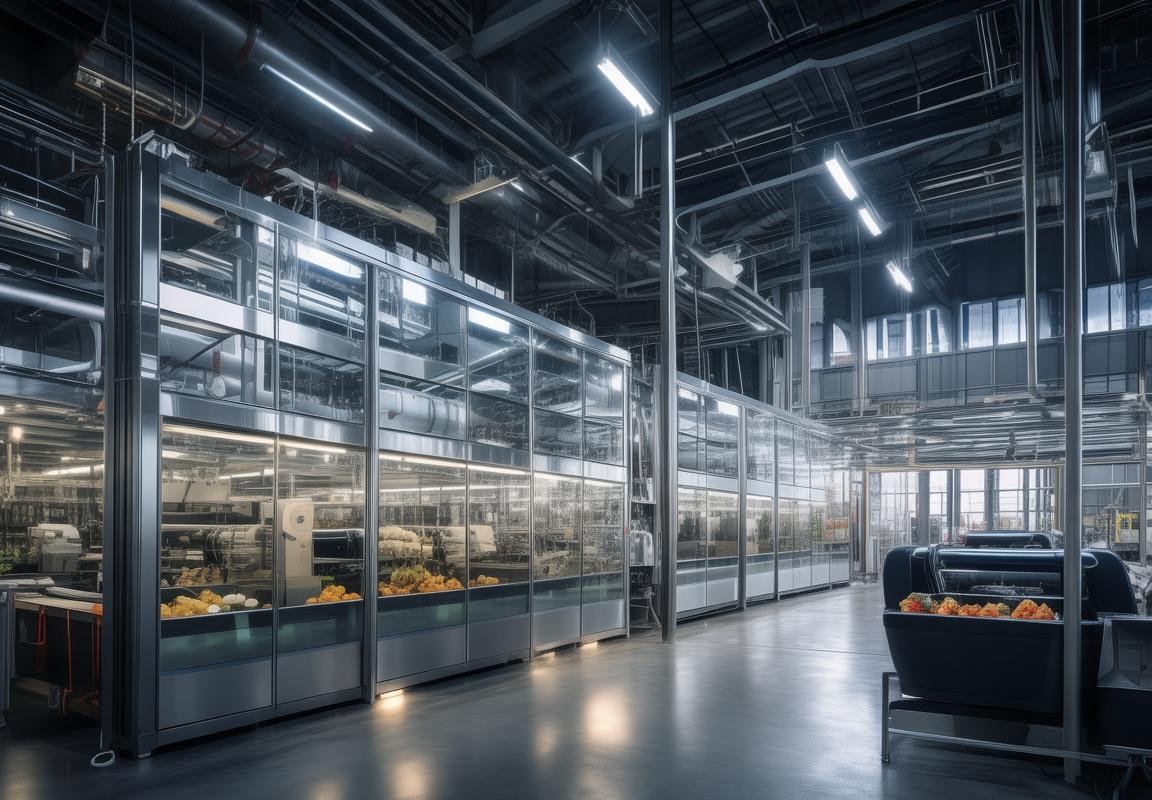
The Rise of Air Fryers in the Commercial Kitchen
The commercial kitchen landscape has undergone a remarkable transformation with the surge in popularity of air fryers. Once a staple in home kitchens, these versatile appliances have now become a staple in the professional culinary world. The rise of air fryers in commercial kitchens can be attributed to several factors that have revolutionized the way chefs and operators approach cooking.
Firstly, the health benefits offered by air fryers have been a major driving force. With a growing awareness of the impact of fats on health, chefs are seeking alternatives that can cook delicious food without the excess oil. Air fryers use hot air circulation to cook food, which results in a crispy outer layer while retaining the moisture and nutrients within. This feature has made them a favorite among health-conscious establishments, from fast-casual restaurants to upscale dining spots.
Secondly, the convenience factor cannot be overlooked. Traditional frying methods often require lengthy preparation times, including the need to heat and dispose of large amounts of oil. Air fryers, on the other hand, are quick to heat up and ready to use in mere minutes. They also eliminate the hassle of cleaning deep fryers, which can be time-consuming and expensive to maintain.
Moreover, the versatility of air fryers has opened up new culinary possibilities. Chefs can now experiment with a wide range of dishes that previously would have been difficult or impossible to prepare without the use of deep fryers. Whether it’s crispy fries, golden chicken, or even desserts, the possibilities are nearly endless. This has allowed chefs to offer a wider variety of menu items without the additional equipment costs or the risks associated with hot oil.
Another reason for the air fryer’s ascent in commercial kitchens is their energy efficiency. Conventional fryers can be energy hogs, especially when cooking large batches of food. Air fryers, however, consume significantly less energy, making them a more sustainable choice for environmentally conscious restaurants and cafes. The lower energy bills also contribute to the financial savings over time, making the initial investment in air fryers more justifiable.
The compact design of air fryers is yet another factor contributing to their popularity. These appliances can be easily integrated into tight kitchen spaces without taking up much counter space. This allows for a more efficient layout, as operators can maximize the use of available area. It also means that multiple air fryers can be used simultaneously without cluttering the workspace.
Safety is also a critical consideration in commercial kitchens, and air fryers have addressed this concern. Unlike deep fryers, which pose a risk of oil spills and fires, air fryers operate at a much lower temperature and use no oil, thus significantly reducing the risk of accidents. This makes them an attractive option for kitchens with busy and potentially distracted staff.
The surge in technology has also played a role in the rise of air fryers. Modern air fryers come equipped with a variety of features that make them user-friendly. Digital controls allow for precise temperature and cooking time adjustments, ensuring consistency across batches. Some models even offer preset cooking programs for different types of food, further simplifying the process.
In the world of fast-food chains and quick-service restaurants (QSRs), the demand for speed and consistency is paramount. Air fryers meet these needs by producing high-quality food in a short amount of time. This is particularly beneficial for businesses looking to maintain long lines and high turnover rates.
Lastly, the cost of operating a commercial kitchen is a significant concern for many operators. The initial cost of air fryers is comparable to that of traditional fryers, and the savings in oil and energy can quickly offset the difference. The longevity of air fryers also plays a part in the overall cost-effectiveness, as they are designed to withstand the rigorous demands of commercial use.
In summary, the rise of air fryers in commercial kitchens is a testament to the evolving culinary landscape. From health and convenience to versatility and safety, these appliances have proven to be a game-changer for chefs and operators alike. As awareness of these benefits grows, it’s clear that air fryers are not just a trend; they are here to stay.
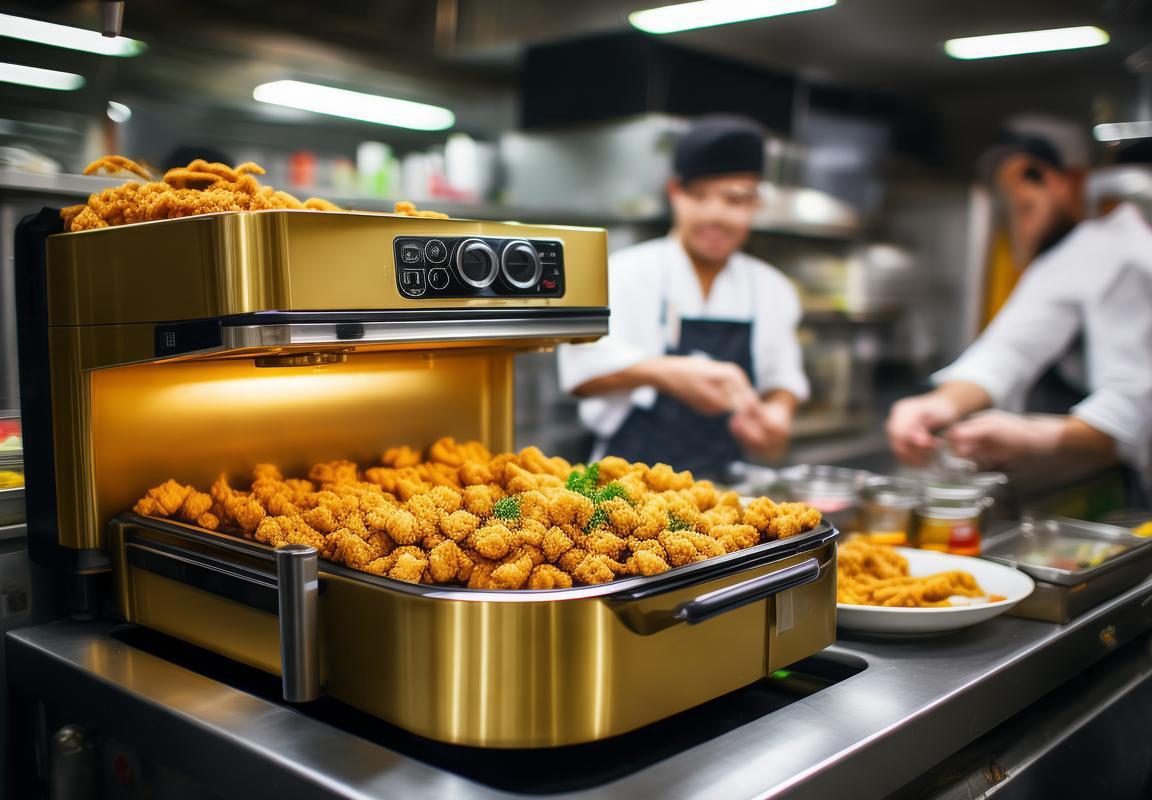
Key Features of a Commercial Air Fryer Factory
In the bustling heart of commercial kitchen landscapes, the commercial air fryer factory stands as a beacon of innovation and efficiency. These factories are not just manufacturing units; they are hubs of cutting-edge technology and quality control, ensuring that the air fryers that leave their premises are not just products but game-changers in the culinary world. Here are some key features that define these factories:
The heart of any commercial air fryer factory is its state-of-the-art equipment. These factories are equipped with the latest machinery that can handle the rigorous demands of mass production. High-speed cutting-edge fryers are designed to ensure uniformity in size and shape, while automated systems can adjust cooking temperatures and times to perfection. The precision of these machines is crucial in maintaining the integrity of the air frying process.
Efficient production lines are a hallmark of commercial air fryer factories. These lines are meticulously designed to maximize output while minimizing downtime. From the initial stages of material handling to the final packaging, each step is optimized for speed and efficiency. Advanced conveyor systems ensure that components move seamlessly from one station to the next, reducing the risk of human error and increasing productivity.
Quality control is paramount in the manufacturing of commercial air fryers. Factories employ rigorous testing protocols at every stage of production to ensure that each unit meets the highest standards. This includes thorough inspections of components, functional tests to verify performance, and safety checks to prevent any potential hazards. The result is a product that is reliable and durable, capable of withstanding the demands of commercial kitchens.
Innovation is a driving force behind the success of commercial air fryer factories. These facilities are constantly researching and developing new technologies to improve their products. This could involve creating more energy-efficient fryers, integrating smart features for remote monitoring, or developing new materials that enhance performance and longevity. The commitment to innovation ensures that the factory remains at the forefront of the industry.
Customization is another key feature of these factories. They understand that no two commercial kitchens are the same, and they offer a range of options to cater to diverse needs. Whether it’s a specific size, capacity, or unique design, these factories can tailor their air fryers to match the exact requirements of their clients. This flexibility is a testament to their adaptability and customer-centric approach.
Energy efficiency is a critical aspect of modern commercial air fryer factories. With environmental concerns on the rise, these factories are investing in technologies that reduce energy consumption. This includes using advanced heating elements that provide more efficient heat transfer and incorporating insulation to retain heat better. The result is a more sustainable product that helps commercial kitchens lower their operational costs.
Safety is a non-negotiable feature in commercial air fryer factories. The design and manufacturing processes prioritize the safety of both the operators and the end-users. This involves using materials that are non-toxic and fire-resistant, as well as incorporating safety features like automatic shut-offs and cool-down timers. The factories also ensure that their products comply with all relevant safety standards and regulations.
Training and support are integral to the service offered by commercial air fryer factories. They understand that the success of their products depends on the knowledge and skills of the operators. Therefore, they provide comprehensive training programs and ongoing support to ensure that customers can make the most out of their air fryers. This commitment to customer satisfaction is a key factor in the reputation of these factories.
Lastly, the supply chain management of commercial air fryer factories is a testament to their operational excellence. They maintain a robust supply chain that ensures a steady flow of raw materials and components. This not only guarantees timely production but also allows for quick response to any supply disruptions. The efficiency of the supply chain is crucial in meeting the demands of the fast-paced commercial kitchen industry.
In summary, the key features of a commercial air fryer factory are a blend of advanced technology, efficient production, rigorous quality control, innovation, customization, energy efficiency, safety, training, and a robust supply chain. These features collectively contribute to the production of high-quality air fryers that are reliable, durable, and tailored to the needs of commercial kitchens worldwide.
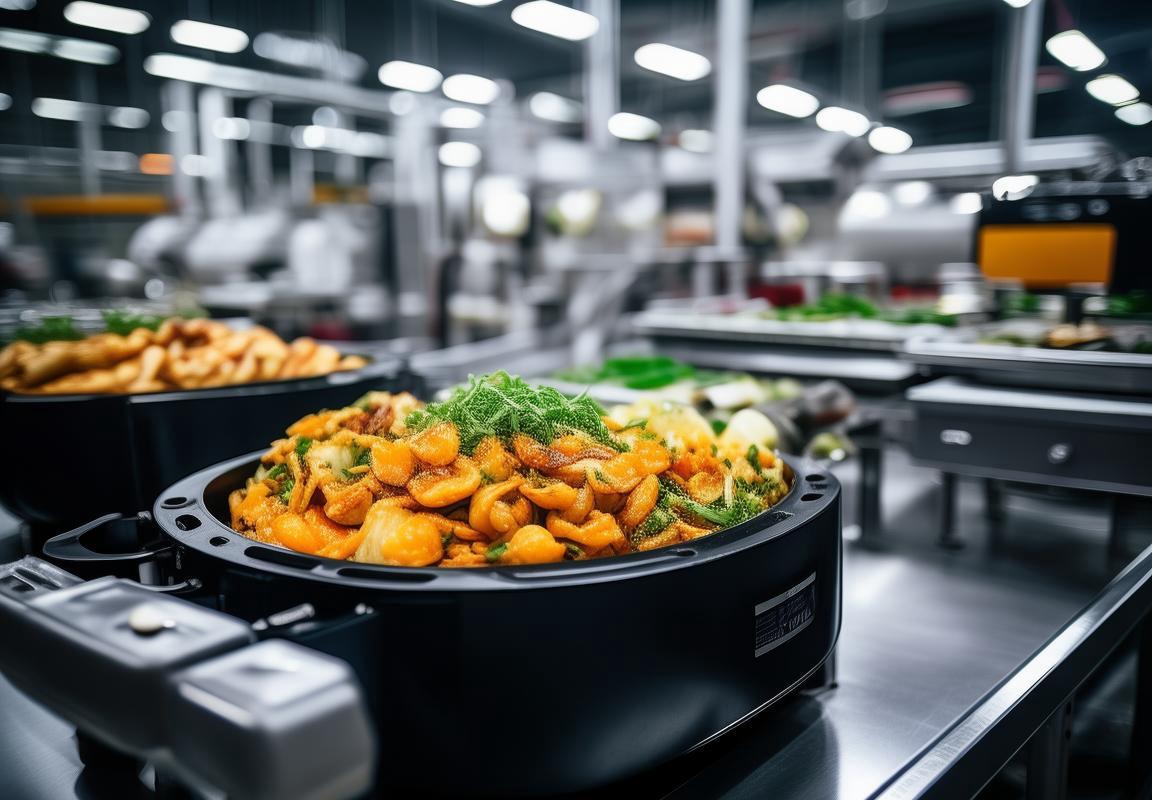
The Process of Manufacturing Commercial Air Fryers
In the bustling heart of a commercial air fryer factory, the journey from raw materials to a finished product is a testament to precision and innovation. The process is a symphony of mechanical precision and human ingenuity, ensuring that each air fryer that rolls off the assembly line is not just a kitchen appliance, but a piece of cutting-edge technology.
The manufacturing process begins with the careful selection of materials. High-quality stainless steel, durable plastics, and precision-engineered components are chosen for their ability to withstand the rigors of commercial use. These materials are then meticulously tested to ensure they meet the strict quality standards set by the factory.
Once the materials are approved, the cutting and shaping process begins. Precision cutting machines slice the steel into precise shapes for the fryer’s body, while plastics are molded into intricate parts. This stage is crucial, as the accuracy of these parts will determine the overall performance and safety of the air fryer.
The next step involves the assembly of these components. Workers, equipped with years of experience, carefully align and secure each part. The assembly line is designed to minimize human error, with automated systems guiding the parts into place. The fryer’s heating element, fan, and filter are all meticulously integrated, ensuring optimal air circulation and efficient cooking.
After assembly, the air fryer undergoes a series of rigorous quality checks. Visual inspections are conducted to ensure that all parts are correctly aligned and that there are no visible defects. Functionality tests follow, where the fryer is checked for even heating and proper air flow. These tests are critical, as they guarantee that the air fryer will perform as intended in a commercial setting.
Once the initial checks are passed, the air fryer is subjected to a series of stress tests. These tests simulate the intense use that a commercial air fryer would experience, including prolonged operation and high temperatures. The fryer is also tested for durability, with parts being subjected to vibrations and shocks that mimic the movement of a busy kitchen environment.
Safety is paramount in the manufacturing process. Each air fryer is equipped with multiple safety features, including overheat protection and automatic shut-offs. These features are tested to ensure they activate reliably under various conditions. Any malfunctioning parts are immediately identified and replaced, ensuring that only air fryers that meet the highest safety standards leave the factory.
The exterior of the air fryer is then painted, with attention to detail to ensure a smooth, durable finish. This finish not only enhances the appearance of the fryer but also provides additional protection against wear and tear. The paint used is heat-resistant, ensuring that it remains intact even during prolonged use.
In the final stages of manufacturing, the air fryer is packaged. Each unit is carefully wrapped to protect it during transit. Packaging materials are chosen for their environmental friendliness, reflecting the factory’s commitment to sustainability. The packaging also includes user manuals, safety warnings, and a warranty card, providing the customer with all the information they need to use their new air fryer safely and effectively.
The entire manufacturing process is guided by a team of engineers and quality assurance experts who continuously monitor and optimize the production line. This team is responsible for introducing new technologies and methodologies that not only improve efficiency but also ensure that the air fryers produced are at the forefront of the industry.
The culmination of this intricate process is a commercial air fryer that is not just a tool but a testament to the factory’s dedication to excellence. Each air fryer is a product of a meticulous, methodical approach that ensures every unit is ready to face the demands of a busy commercial kitchen.
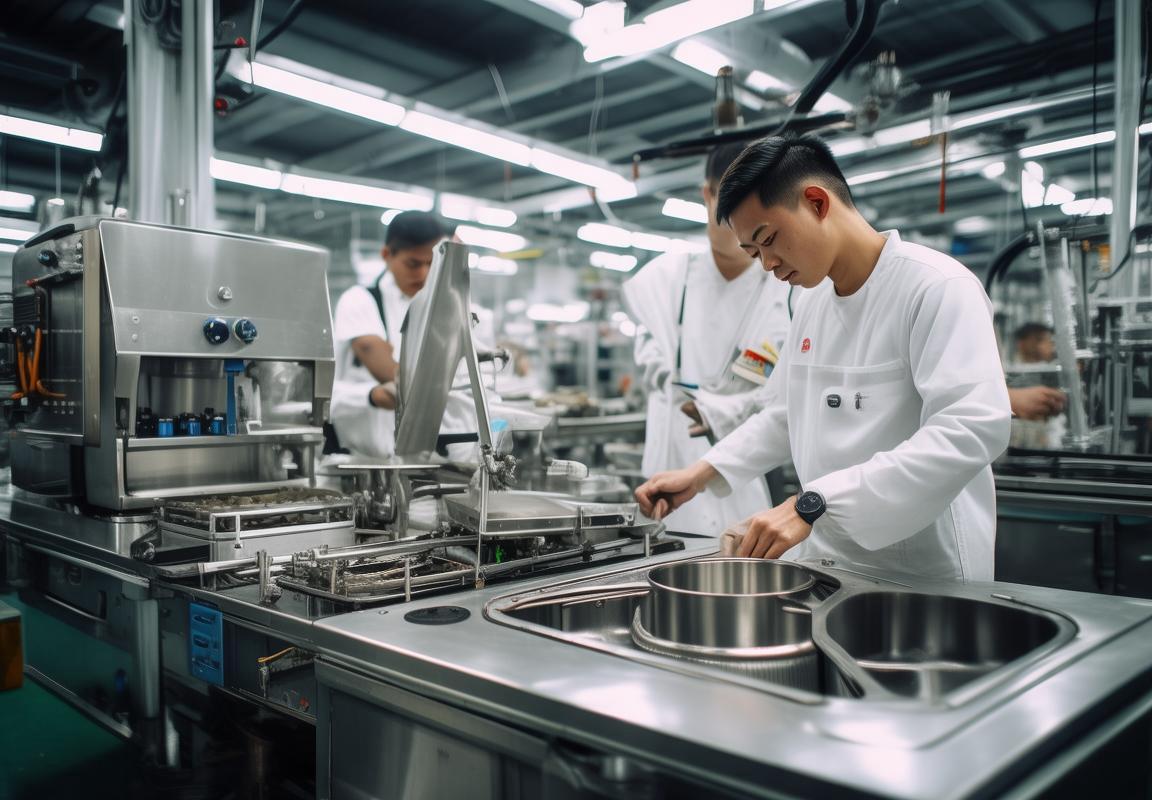
Benefits of Buying from a Commercial Air Fryer Factory
In the bustling world of commercial kitchens, where efficiency and innovation are paramount, the role of commercial air fryer factories has become increasingly significant. These factories are the heart of the industry, producing equipment that not only enhances the flavor of dishes but also streamlines operations. Here’s a closer look at the benefits of sourcing your commercial air fryers from such factories.
The Precision of CustomizationCommercial air fryer factories offer a level of customization that standard kitchen equipment simply can’t match. Whether it’s the size of the fryer, the type of cooking basket, or the specific power requirements, these factories can tailor the air fryers to the unique needs of a restaurant or commercial kitchen. This level of specificity ensures that the equipment is not just functional but also fits seamlessly into the existing setup.
Economies of Scale and Cost-EffectivenessWhen you purchase from a commercial air fryer factory, you’re not just buying a product; you’re buying into the economies of scale. Factories that specialize in commercial air fryers can produce in large volumes, which means lower costs per unit. This cost-effectiveness translates to savings for businesses, allowing them to invest in other critical areas of their operations or pass the savings on to their customers.
Superior Build Quality and ReliabilityCommercial kitchens are harsh environments, and the equipment they use must withstand rigorous use. Air fryer factories understand this and focus on building fryers that are not just robust but also reliable. These fryers are designed with durable materials and components that can handle the intense demands of commercial cooking, reducing downtime and the need for frequent repairs.
Energy Efficiency and Environmental ResponsibilityAs sustainability becomes a more critical factor in business operations, commercial air fryer factories are stepping up to the plate. Modern air fryers are designed to be energy-efficient, using less oil and less electricity than traditional fryers. This not only saves on operational costs but also reduces the environmental footprint of commercial kitchens, making them more eco-friendly.
Advanced Cooking TechnologyCommercial air fryer factories are at the forefront of cooking technology. They incorporate innovative features that allow for a wide range of cooking styles, from crispy fries to tender meats, all with the health benefits of deep-frying with little to no oil. These advancements in technology mean that kitchens can offer a diverse menu that appeals to health-conscious customers without sacrificing taste or quality.
Extensive Product Line and FlexibilityWhether a kitchen is looking for a compact countertop model or a large industrial-grade fryer, commercial air fryer factories have the variety to meet every need. This extensive product line ensures that businesses can find the perfect fit for their space, whether they’re running a busy fast-food chain or a fine dining establishment.
Quality Assurance and After-Sales SupportThe best commercial air fryer factories take pride in their quality assurance processes. From sourcing high-quality materials to rigorous testing of each unit, these factories ensure that every air fryer that leaves their facility meets the highest standards. Additionally, they often offer comprehensive after-sales support, including installation assistance, maintenance tips, and technical support, which can be invaluable to businesses looking to get the most out of their investment.
Longevity and WarrantiesWhen you invest in a commercial air fryer from a reputable factory, you’re investing in longevity. These fryers are built to last, and many come with robust warranties that protect against manufacturing defects. This means that your kitchen can enjoy the benefits of a high-quality fryer for years to come without worrying about unexpected repair costs.
In conclusion, buying from a commercial air fryer factory offers numerous benefits, from customization and cost savings to superior build quality and cutting-edge technology. These factories are not just suppliers; they are partners in creating efficient, sustainable, and successful commercial kitchens.

The Importance of Energy Efficiency in Commercial Air Fryers
In today’s fast-paced commercial kitchen environment, the demand for energy-efficient appliances has never been higher. This is particularly true for commercial air fryers, which have become a staple in many kitchens due to their ability to offer a healthier alternative to traditional frying methods. The importance of energy efficiency in commercial air fryers cannot be overstated, as it impacts not only the bottom line but also the environmental footprint of the establishment.
Commercial air fryers are designed to use significantly less oil than traditional deep fryers, which reduces the amount of waste and the need for frequent oil changes. This not only cuts down on costs but also minimizes the environmental impact of disposing of used oil. The energy-saving aspect of these fryers is achieved through advanced heat distribution systems that maximize efficiency and minimize energy consumption.
One of the key features of energy-efficient commercial air fryers is their ability to maintain consistent temperatures. These fryers are equipped with precise thermostats that ensure the oil is heated to the optimal temperature for cooking, preventing unnecessary energy usage. When the fryer reaches the desired temperature, it automatically adjusts to maintain it, avoiding the constant reheating that occurs in traditional fryers.
The compact design of commercial air fryers also contributes to their energy efficiency. These fryers take up less space than larger, traditional fryers, which means they can be placed closer to the cooking area. This reduces the distance that heat must travel, further conserving energy. Additionally, the smaller footprint allows for better airflow, which can help to maintain a cooler kitchen environment, reducing the need for additional cooling systems.
Another important factor in the energy efficiency of commercial air fryers is the use of insulation. High-quality insulation helps to retain heat within the fryer, reducing the amount of energy required to maintain cooking temperatures. This not only saves on energy costs but also extends the life of the fryer by reducing wear and tear on its heating elements.
For establishments looking to reduce their carbon footprint, energy-efficient commercial air fryers are a wise investment. These fryers can significantly lower the amount of energy consumed during operation, leading to substantial savings over time. In fact, some models have been shown to reduce energy consumption by as much as 70% compared to traditional deep fryers.
Moreover, the cost savings from using energy-efficient commercial air fryers can be substantial. With the rising costs of electricity and the increasing importance of sustainability, businesses are always on the lookout for ways to cut expenses. By investing in energy-efficient appliances, commercial kitchens can see a return on their investment through lower utility bills.
Energy efficiency is not just about saving money; it’s also about the long-term sustainability of the business. Commercial air fryers that are designed to use less energy are often built to last longer. This means fewer repairs and replacements, which can save businesses both time and money. Additionally, the longevity of these fryers can help maintain the reputation of the establishment as a forward-thinking and environmentally conscious operator.
Furthermore, energy-efficient commercial air fryers often come with additional features that enhance their operational efficiency. For instance, some models include timers and programmable settings that allow chefs to pre-set cooking times and temperatures, ensuring that the fryer operates only when needed. This prevents unnecessary energy usage during off-peak hours.
In the realm of environmental responsibility, energy efficiency in commercial air fryers is a key component. As businesses strive to minimize their ecological impact, they turn to appliances that are not only cost-effective but also eco-friendly. By choosing energy-efficient fryers, commercial kitchens can contribute to a greener future, reducing their carbon emissions and supporting global sustainability efforts.
In conclusion, the importance of energy efficiency in commercial air fryers cannot be ignored. From the financial savings to the environmental benefits, these fryers offer a win-win situation for businesses. As awareness of sustainability grows, the demand for energy-efficient appliances is likely to increase, making the choice to invest in such fryers a wise and forward-thinking decision for any commercial kitchen.
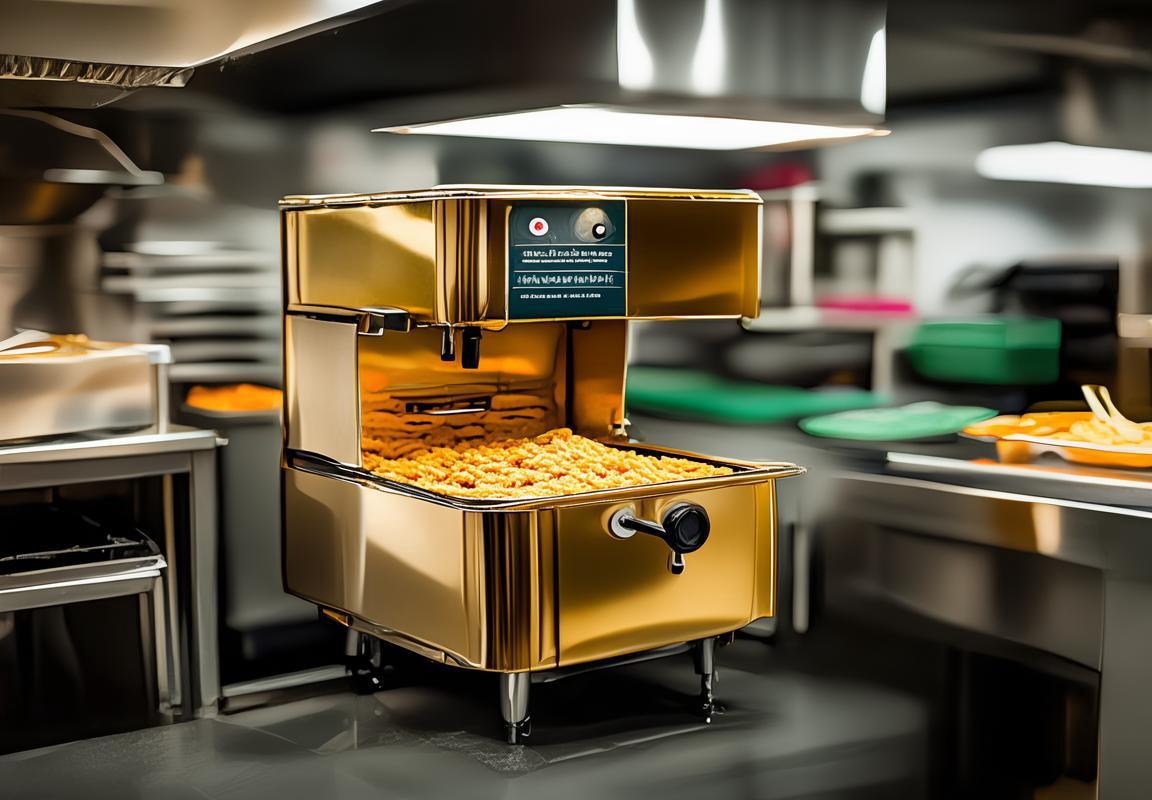
How Commercial Air Fryer Factories Keep Up with Industry Trends
In the fast-paced world of commercial kitchen appliances, staying ahead of the curve is crucial. Commercial air fryer factories must adapt and evolve to meet the ever-changing demands of the market. Here’s how they manage to keep up with industry trends:
Technology IntegrationThe landscape of commercial air fryer production is constantly evolving with new technologies. Factories invest in cutting-edge software that allows for precision in design and engineering. This integration means that each air fryer is not just a product but a piece of technology designed to enhance efficiency and performance.
Customization for Diverse NeedsRestaurants and foodservice operators have varied requirements. A commercial air fryer factory that thrives on industry trends offers a range of customizable options. From different sizes and capacities to specific features that cater to unique cooking styles, these factories ensure that their products meet the diverse needs of their clients.
Collaboration with Chefs and Industry ExpertsTo truly understand the demands of the market, commercial air fryer factories often collaborate with chefs and culinary experts. These partnerships provide valuable insights into emerging cooking techniques and the latest trends in the food industry. By involving these professionals in the design process, factories can create appliances that not only meet but exceed the expectations of chefs and operators.
Continuous InnovationThe pursuit of innovation is a non-stop endeavor for commercial air fryer factories. They invest in research and development to create more energy-efficient models, introduce new cooking functions, and enhance the user experience. This constant push for innovation ensures that the products hitting the market are not just up-to-date but also setting new standards.
Focus on SustainabilitySustainability has become a major concern for both businesses and consumers. Commercial air fryer factories are responding by designing appliances that are more environmentally friendly. This includes using recycled materials, reducing energy consumption, and creating products that are easy to maintain and dispose of responsibly.
Adapting to Digital PlatformsThe digital age has transformed the way businesses operate. Commercial air fryer factories have embraced e-commerce, social media, and online marketing to reach a wider audience. By leveraging digital platforms, they can showcase their products, provide customer support, and gather feedback from a global market.
Global Market AnalysisTo keep up with industry trends, commercial air fryer factories must have a keen eye on the global market. They analyze market reports, attend trade shows, and stay abreast of international foodservice regulations. This knowledge allows them to tailor their products to different regions and to anticipate future demands.
Investing in Quality ControlQuality control is paramount in the commercial kitchen appliance industry. Factories that stay ahead of trends invest in rigorous quality control processes. This ensures that every air fryer leaving the factory is not only efficient and durable but also meets the highest safety standards.
Training and EducationAs new features and technologies are introduced, training and education become essential. Commercial air fryer factories often offer workshops and training sessions for operators and maintenance staff. This ensures that users can maximize the potential of their appliances and understand the latest trends in commercial cooking.
By embracing these strategies, commercial air fryer factories are not just keeping up with industry trends; they are leading the way in innovation and meeting the dynamic needs of the commercial kitchen market.
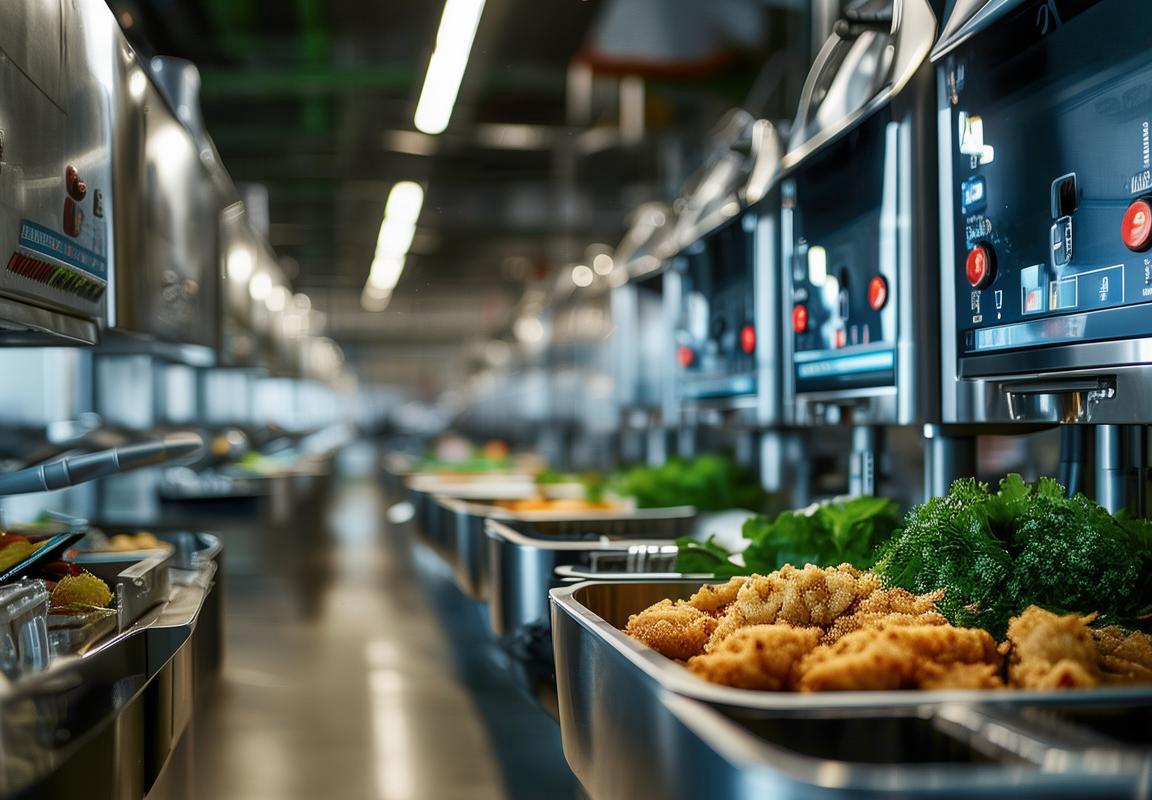
Conclusion: The Future of Commercial Air Fryer Production
The commercial air fryer market has experienced a remarkable surge in recent years, and this trend is poised to continue as more businesses recognize the benefits of these innovative cooking appliances. From fast-food chains to gourmet restaurants, the demand for commercial air fryers has skyrocketed. Let’s delve into how these factories stay ahead in the race to produce the latest and greatest in air frying technology.
Commercial air fryer factories must constantly adapt to changing consumer preferences and emerging industry standards. One way they do this is by investing in research and development (R&D). These factories often have dedicated teams that scour the latest scientific findings and culinary innovations to ensure their products are at the forefront of the market. This R&D focus allows them to introduce new features like advanced temperature control systems and intelligent cooking modes that cater to specific recipes and food types.
Another critical aspect is the integration of technology in their production lines. These factories leverage automation and robotics to streamline the manufacturing process, reducing human error and increasing efficiency. By using computer-aided design (CAD) software, engineers can create precision parts that fit together seamlessly, ensuring the durability and reliability of the air fryers they produce.
The ability to customize is a key feature that commercial air fryer factories emphasize. They understand that each business has unique needs, whether it’s a specific size, power output, or design. By offering tailored solutions, factories can cater to the diverse requirements of their clients, from small cafes to large commercial kitchens. This flexibility also allows for the creation of specialized models for specific foodservice applications, such as deep-frying without the oil.
Staying compliant with global safety standards is non-negotiable for commercial air fryer factories. They adhere to rigorous testing protocols to ensure that their products meet or exceed safety regulations. This includes electrical safety, material integrity, and thermal management. By doing so, these factories not only protect their customers but also build trust in their brand.
The environmental impact of commercial kitchen equipment is increasingly important. Air fryer factories are responding by focusing on energy efficiency. They design their fryers to use less electricity while still providing the same or better performance as traditional fryers. This not only reduces operational costs for businesses but also minimizes their carbon footprint, a crucial factor for eco-conscious customers and businesses.
Innovation in materials is another area where commercial air fryer factories are making strides. They use high-quality, durable materials that can withstand the harsh conditions of a commercial kitchen environment. Additionally, some factories are exploring sustainable materials, like recycled plastics and bio-based resins, to reduce their environmental impact.
The digital transformation of the industry is also a significant factor. Commercial air fryer factories are incorporating smart technology into their products, allowing for remote monitoring, predictive maintenance, and data-driven insights. This connectivity not only enhances the user experience but also helps businesses optimize their energy use and maintenance schedules.
The competitive landscape is constantly evolving, and commercial air fryer factories must stay informed about industry trends. They achieve this by attending trade shows, participating in industry forums, and engaging with customers to understand their evolving needs. This proactive approach ensures that when a new trend emerges, such as the popularity of plant-based diets, these factories can quickly adapt their product lines to meet the demand.
In conclusion, the future of commercial air fryer production is one of continuous innovation and adaptation. As consumer preferences shift, so too must the factories that supply these appliances. By focusing on R&D, technology integration, customization, safety, sustainability, and staying informed about industry trends, commercial air fryer factories are well-positioned to lead the market into the future. Whether it’s through new cooking technologies, enhanced user experiences, or environmentally friendly practices, the industry is poised for growth and transformation.